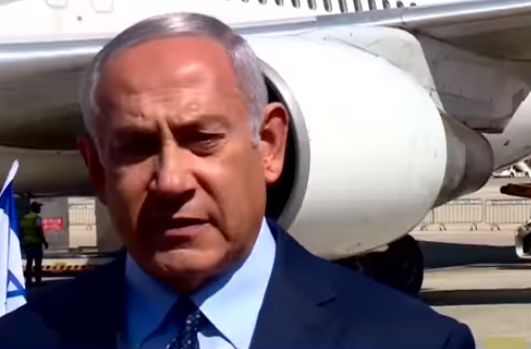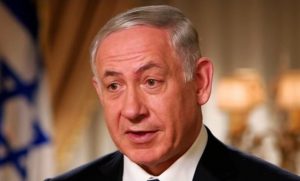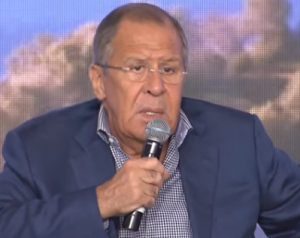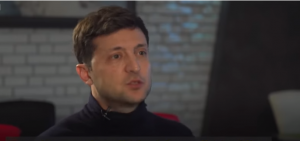
1 January 2020. The Times of Israel: Prime Minister Benjamin Netanyahu officially announced Wednesday night that he would ask the Knesset for immunity from prosecution in the three criminal cases against him.
Netanyahu made the statement in a nationally televised appearance four hours before a midnight deadline, defending the decision as protection from “trumped-up charges.”
“In order to continue to lead Israel to great achievements, I intend to approach the speaker of the Knesset in accordance with chapter 4C of the law, in order to fulfill my right, my duty and my mission to continue to serve you for the future of Israel,” he said.
An official request was later submitted to Knesset Speaker Yuli Edelstein from a law firm retained by Netanyahu.
Moments after the announcement, Yisrael Beytenu leader Avigdor Liberman announced his party would oppose immunity, drastically complicating Netanyahu’s prospects of winning the necessary 61 votes he will need. But the request effectively freezes the criminal process against him until the Knesset rules on the matter — a process which, due to parliament’s dissolution last month ahead of new elections, could buy Netanyahu several months until a formal indictment can be filed with the Jerusalem District Court.
The premier has been charged with fraud and breach of trust in three criminal cases and bribery in one of them.
Days after giving a speech in which he defended immunity as a “cornerstone of democracy,” the prime minister repeated his claims that he was the victim of persecution by authorities, and asserted that “immunity is intended to protect elected representatives from trumped up charges. It was intended to ensure that those elected by the people can serve the people, according to the will of the people.”
The ask essentially sets up the upcoming March 2 election as a referendum on Netanyahu and his legal troubles. The Likud leader’s allies have presented the judicial proceedings as an undemocratic attempt to remove him from power and have begun campaigning on the idea of voting Likud as a way of protecting the prime minister from prosecution.
Touting his accomplishments as prime minister over the past decade, Netanyahu said: “I intend to keep leading Israel for many more years to historic achievements which I am working towards day and night… achievements we could once only dream of and which are now within reach.” He vowed to stop Iran, set Israel’s permanent borders, sign a defense pact with the US, obtain more peace agreements with Arab states, and extend Israeli sovereignty into the territories.
The premier’s announcement came after months in which he has remained evasive when questioned about his intentions on the matter, and in one case told Channel 12 during an interview “no way,” when asked if he would make any move to thwart his indictment.
On Wednesday he defended that statement, saying he continued to stand behind his words and insisting he would not avoid an eventual day in court.
“Immunity is always temporary. It is canceled at the end of the term of the Knesset that gave it. By law there is no way for anyone to avoid prosecution. So when I was asked by Channel 12 ‘Will you push for a law or move that will prevent you from being prosecuted?’ I said no. Tonight I once again say ‘No way.’ I did not advance any law or change any law. I intend to go to court and destroy all the preposterous claims against me [after leaving office].”
He once again alluded to a conspiracy against him, accusing authorities of engaging in “trumped-up charges, selective enforcement, blackmail of state’s witnesses” and more. He claimed exonerating information was “being held in the shadows under gag orders and attorney general decisions.”
Under a 2005 change to the Knesset immunity law, members of the legislature no longer receive automatic immunity from prosecution but must request it from the plenum when relevant. Netanyahu is apparently planning to base his petition on clauses in the immunity law that allow an MK to ask for protection from prosecution under the claim that an indictment has been filed in “bad faith” or while discriminating against the defendant, and/or that prosecution would counter the will of the electorate.
Despite Netanyahu’s assertion that any immunity would be temporary, his actual request sent to Edelstein indicated otherwise: the prime minister’s lawyers wrote he was asking for functional immunity in one of the three cases against him as well as in certain aspects of another. Functional immunity protects parliamentarians from prosecution for things they did in fulfilling their parliamentary work, and is permanent, rather than temporary. Procedural immunity is temporary, and has to do with offenses committed by a parliamentarian that are unrelated to his parliamentary work.
Netanyahu’s attorneys, in their request to the Knesset speaker, asserted that his actions in Case 2000 — in which he is suspected of an illicit quid pro quo deal with Yedioth Ahronoth newspaper publisher Arnon Mozes that would weaken a rival daily — fell under the purview of functional immunity as “all that is attributed to him in this charge was done by the prime minister as part of his work as a Knesset member.”
They also said his alleged attempts to extend tax exemptions for returning expats to aid billionaire Arnon Milchan, under Case 1000, deserved functional immunity “as here too the indictment attributes actions to the prime minister carried out as part of his work as a Knesset member, in the framework of reviewing potential legislation.”
Issuing a scathing response even before Netanyahu’s presser was over, Liberman said his party would oppose the immunity request.
“Now it is clear beyond doubt. The only thing that has interested and interests Netanyahu is immunity,” Liberman wrote in a Facebook post. “The State of Israel has become a hostage to Netanyahu’s personal problem. He doesn’t care about left or right, religious or secular. The only thing that concerns him is a coalition for immunity. The rest is old wives’ tales.”
Blue and White chairman Benny Gantz said Netanyahu’s announcement showed the premier “knows he is guilty.” Gantz said his party would push for the establishment of the Knesset House Committee so the immunity request can be debated by parliament quickly.
Gantz said the country now faced a choice between “the Kingdom of Netanyahu… or the State of Israel.”
Netanyahu’s announcement came four hours before his midnight deadline to make the request or forfeit his right to do so. Some reports suggested that the decision came down to the wire, with the premier’s inner circle deeply uncertain about the move.
Reports on Channel 12, Channel 13 and Kan said Netanyahu’s advisers were concerned that an immunity request, seen as unpopular among the general public, could hurt the prime minister’s chances in the March 2 election and make him less likely to be able to cobble together a majority coalition following the national poll — a feat he also failed to achieve in 2019’s two elections.
The prime minister is far from assured of getting majority support for immunity and many pundits believe his bid will not succeed. But failing to make the request would have meant the criminal process against him would immediately move forward.
His request must now by weighed by the Knesset House Committee before it can be voted upon by the plenum, but due to the lack of a functioning legislature amid ongoing political deadlock, and with new elections set, there is currently no functioning House Committee. The Knesset will thus likely only be able to review and decide on his request after a coalition is formed — if it is finally formed — following the March 2 vote.
Netanyahu’s chief rivals in the Knesset, the Blue and White party, are seeking to expedite the process. Party MK Avi Nissenkorn has asked Knesset Speaker Edelstein to swiftly call a meeting of the Knesset Arrangements Committee, which Nissenkorn heads, to discuss the possibility of forming a House Committee under the special circumstances to discuss Netanyahu’s request.
The matter is legally contentious, and led recently to mud-slinging and arguments as to whether the Arrangements Committee has the authority to form a House Committee during a transitional government.
Blue and White complained Wednesday that Edelstein was delaying the process, responding that he was abroad until the weekend, and wished to meet with the Knesset’s legal adviser before reviewing Nissenkorn’s request.
“Edelstein’s response is a shameful attempt to prevent the Knesset from discussing Netanyahu’s immunity request. We would not have imagined that the Knesset speaker would use his statesman’s position to turn the Israeli Knesset into a shelter [from prosecution],” Blue and White said in a statement.
In recent days Netanyahu had described his right to immunity as “a cornerstone of democracy.”
A request from the Knesset for immunity is seen as unpopular among voters, even among many of the prime minister’s supporters. A poll published Sunday evening by Channel 12 news found that 51 percent of Israelis oppose such a move, while only 33% support it.
Channel 13 television news reported Monday that Netanyahu had already formulated his request and informed Edelstein of his intention to submit it.
The unsourced television report said that Netanyahu wrote in the letter that he would be willing to face criminal prosecution, but only after he left political life.
He reportedly argued that trying him now would compromise the will of the electorate and harm the Knesset, since many of the witnesses in the trial are current lawmakers; that it would discriminate against him, since indictments haven’t been filed against other politicians; and that the charges were announced in “bad faith,” since Attorney General Avichai Mandelblit made his decision too soon after the pre-indictment hearing, and the process was marred by numerous leaks to the press.
Edelstein’s office rejected the report, with a spokesperson telling The Times of Israel late Monday: “No request has been made.”
Earlier on Monday, Netanyahu’s staff invited the media to a live statement to the press for 8 p.m., only to cancel it just half an hour later. Netanyahu was believed to have planned to formally announce he would be seeking immunity.
It was not immediately clear why Netanyahu canceled the announcement, which came shortly before hundreds of his supporters gathered Monday evening at Habima Square in Tel Aviv to protest against the criminal cases and support his immunity bid.
Mandelblit in November announced his intention to indict the prime minister in three corruption cases. Netanyahu is charged with fraud and breach of trust in all three cases, as well as bribery in one of them. He denies wrongdoing and has accused police and state prosecutors of an “attempted coup” against him.
In a related development, the High Court of Justice on Tuesday morning held a preliminary hearing on whether a lawmaker facing criminal indictment can be tapped to form a coalition. Ruling against the possibility of tasking an indicted lawmaker with forming a government would immensely complicate Netanyahu’s position. The court indicated its wariness on making such a fateful ruling during the election period and after concluding the session said that a decision would be handed down at a later date.
The cloud of corruption charges hanging over the premier is widely seen as one of the chief reasons he has failed to form a government in the wake of two elections in 2019. Blue and White has repeatedly said it would not join a coalition under Netanyahu so long as he is suspected of criminal wrongdoing.




